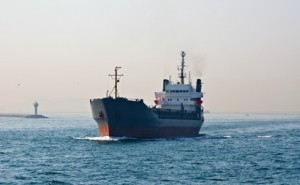Trump Tariffs on Russia’s Oil Buyers Bring Economic, Political Risks
From punishing Brazil to trying to curb imports of fentanyl, U.S. President Donald Trump has wielded the threat of tariffs as an all-purpose foreign policy weapon.

 Representing nearly 80% of the world’s merchant fleet, the International Chamber of Shipping (ICS) on Monday called on the International Maritime Organization (IMO) to hurry up with a critical study that will decide whether the sulphur content in ships’ fuels will be reduced to .5% by 2020 or be postponed until 2025.
Representing nearly 80% of the world’s merchant fleet, the International Chamber of Shipping (ICS) on Monday called on the International Maritime Organization (IMO) to hurry up with a critical study that will decide whether the sulphur content in ships’ fuels will be reduced to .5% by 2020 or be postponed until 2025.
Concerns amongst shipowners have been mounting for some time now about whether or not the global fuel supply will be sufficient enough to meet the upcoming IMO regulations calling for fuel with nearly 90% less sulphur content than the fuels used today. Insufficient supply, ICS warns, could mean that the costs to obtain the required fuels will be “prohibitively expensive” for shipowners, amongst others.
“Governments will surely want to avoid any perception that a blind eye has been turned to the practical implementation of the measures as the issue of fuel availability becomes increasingly pressing,” says ICS Secretary General, Peter Hinchliffe. “It is essential that a global fuel availability study is carried out sufficiently in advance of 2020 in order to give the refiners adequate time to invest and react.”
The 2008 amendment to MARPOL Annex VI requires that the IMO provide a complete study into the switch by 2018. But ICS says 2018 just won’t cut it.
“The major refinery upgrading required could take a minimum four or five years, perhaps longer, and we fear that completing the study in 2018 would simply be too late,” said Hinchcliffe.
In Octoboer, ICS plans to submit a formal request to the IMO’s Marine Environment Protection Committee (MEPC) requesting they begin work now on a preliminary study in order to gauge the market and realistically based on 2015’s introduction of an even lower sulphur limit for vesssels operating in designated Emission Control Areas (ERAs) of the Baltic Sea, North Sea and North America. Such a study, ICS says, will “provide a projection of possible scenarios” that can then be placed “against the background of the world market.”
Hinchcliffe adds, “When the global requirement to switch to distillate was adopted four years ago, ICS supported the agreed IMO timetable as an acceptable compromise. But if the switch to low sulphur fuel is to be successful, those governments that advocated such ambitious goals need to do everything possible to help ensure that the refineries are able to deliver. We strongly believe this means undertaking the required studies of fuel availability as soon as possible.”
Fuel is by far the largest operational cost for shipowners and has already increased in price by about 300% since 2000, according to ICS. However, the current 50% price differential between low sulphur distillate and the residual fuel oil that is currently in use is predicted to increase further if the new demand that will be created by the MARPOL requirements is not matched by increased supply. Exhaust gas cleaning systems, or ‘scrubbers’, have been predicted to cost in excess of US$2 million per engine if fitted on board larger ships. Still, it is not yet clear whether these will be technically, environmentally, or economically viable for use on a widespread basis before the 2015 or 2020 deadlines.
Timetable for new limits to sulphur content in ships’ fuel agreed by IMO (2008 amendment to MARPOL Annex VI):

Sign up for gCaptain’s newsletter and never miss an update

Subscribe to gCaptain Daily and stay informed with the latest global maritime and offshore news
Essential news coupled with the finest maritime content sourced from across the globe.
Sign Up